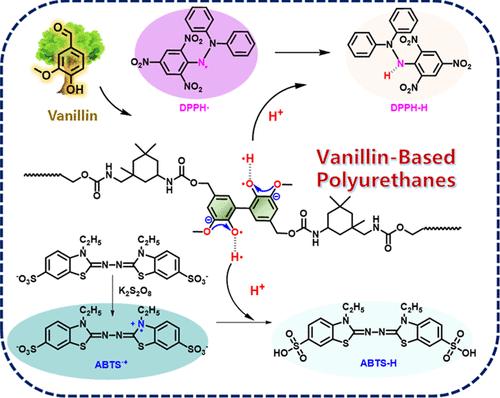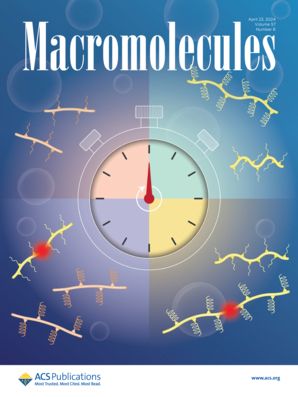Synthesis of Vanillin-Based Polyurethane with Super Thermal Stability and Free-Radical-Scavenging Activity
IF 5.1
1区 化学
Q1 POLYMER SCIENCE
引用次数: 0
Abstract
This work focuses on designing biobased polyurethane systems possessing intrinsic free radical scavenging activity (RSA), exceptional toughness, and thermal stability. Initially, divanillyl alcohol (DVO) was synthesized through oxidative coupling activation of the vanillin precursor, followed by reduction of aldehyde groups. Subsequently, polyurethanes denoted as RSPU-x (where x is the molar ratio of DVO) were synthesized, using polycaprolactone diol (OH-PCL–OH) as the soft segment and isophorone diisocyanate (IPDI) along with DVO as the hard segments. With an increase in the DVO content from 0 to 0.25, the thermal stability and mechanical properties of RSPU-x were significantly enhanced. Specifically, the maximum thermal decomposition temperature rose from 317 to 417 °C, while the toughness shot up from 38.1 MJ/m3 to 223.9 MJ/m3. The improvement of thermal stability is attributed to the biphenyl structure of DVO, which has high bond dissociation energy and exceptional free radical scavenging activity, while enhanced toughness primarily results from the introduction of the DVO rigid skeleton, which disrupts the regularity of PCL chains, thereby inhibiting PCL crystallization behavior. Additionally, RSPU-x also exhibited inherent free radical scavenging activity due to the presence of Ar–OH groups in the skeletons. The RSA of RSPU-0.25 (DPPH and ABTS tests) reached, respectively, 94.21% and 99.24% within 0.5 h, achieved via the H+ transfer mechanism. This work presents a novel strategy for preparing polyurethanes with exceptional thermal stability and RSA properties.

具有超强热稳定性和自由基清除活性的香草素基聚氨酯的合成
这项工作的重点是设计生物基聚氨酯系统具有内在的自由基清除活性(RSA),特殊的韧性和热稳定性。首先,通过氧化偶联激活香兰素前体,然后还原醛基合成二香草醇(DVO)。随后,以聚己内酯二醇(OH-PCL-OH)为软段,异佛尔酮二异氰酸酯(IPDI)和DVO为硬段,合成了聚氨酯,记为RSPU-x (x为DVO的摩尔比)。当DVO含量从0增加到0.25时,RSPU-x的热稳定性和力学性能显著增强。其中,最高热分解温度从317℃上升到417℃,韧性从38.1 MJ/m3上升到223.9 MJ/m3。热稳定性的提高主要归功于DVO的联苯结构,该结构具有较高的键解离能和良好的自由基清除活性,而韧性的增强主要是由于DVO刚性骨架的引入,它破坏了PCL链的规律性,从而抑制了PCL的结晶行为。此外,由于骨架中存在Ar-OH基团,RSPU-x还表现出固有的自由基清除活性。RSPU-0.25 (DPPH和ABTS测试)在0.5 h内的RSA分别达到94.21%和99.24%,是通过h +转移机制实现的。这项工作提出了一种新的策略,用于制备聚氨酯具有优异的热稳定性和RSA性能。
本文章由计算机程序翻译,如有差异,请以英文原文为准。
求助全文
约1分钟内获得全文
求助全文
来源期刊

Macromolecules
工程技术-高分子科学
CiteScore
9.30
自引率
16.40%
发文量
942
审稿时长
2 months
期刊介绍:
Macromolecules publishes original, fundamental, and impactful research on all aspects of polymer science. Topics of interest include synthesis (e.g., controlled polymerizations, polymerization catalysis, post polymerization modification, new monomer structures and polymer architectures, and polymerization mechanisms/kinetics analysis); phase behavior, thermodynamics, dynamic, and ordering/disordering phenomena (e.g., self-assembly, gelation, crystallization, solution/melt/solid-state characteristics); structure and properties (e.g., mechanical and rheological properties, surface/interfacial characteristics, electronic and transport properties); new state of the art characterization (e.g., spectroscopy, scattering, microscopy, rheology), simulation (e.g., Monte Carlo, molecular dynamics, multi-scale/coarse-grained modeling), and theoretical methods. Renewable/sustainable polymers, polymer networks, responsive polymers, electro-, magneto- and opto-active macromolecules, inorganic polymers, charge-transporting polymers (ion-containing, semiconducting, and conducting), nanostructured polymers, and polymer composites are also of interest. Typical papers published in Macromolecules showcase important and innovative concepts, experimental methods/observations, and theoretical/computational approaches that demonstrate a fundamental advance in the understanding of polymers.
 求助内容:
求助内容: 应助结果提醒方式:
应助结果提醒方式:


